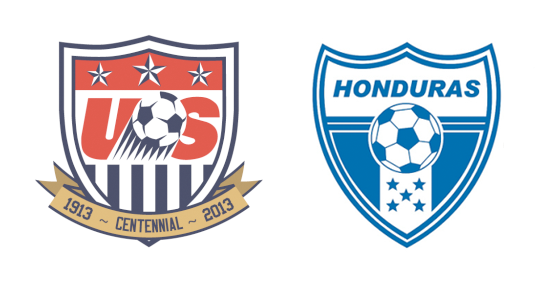On Tuesday night, in Sandy, Utah’s Rio Tinto Stadium, the U.S. Men’s National Team will take on Honduras in the last of three Hexagonal-round World Cup Qualifiers in a span of 12 days (ESPN, Watch ESPN, UniMas. Coverage begins at 8:30 p.m. Eastern; kick-off at 9 p.m.). With a win, the U.S. will have collected nine points from the nine available in the current qualification cycle, and put them in excellent position to qualify for Brazil and firmly at the top of the Hex with 13 points.
The yellow card situation
With a suddenly-settled back line, it is unfortunate that the U.S. will be without DaMarcus Beasley, who picked up a second Hexagonal-round yellow card against Panama. With Graham Zusi returning from his own yellow card suspension, the adjustment to the team is likely straightforward—moving Fabian Johnson from left midfield to left back, and Eddie Johnson from the right side to the left, with Zusi reclaiming right midfield—but the situation is approaching dire. A total of nine U.S. players now have one booking, with another resulting in a suspension: Jozy Altidore, Matt Besler, Michael Bradley, Geoff Cameron, Brad Davis, Clint Dempsey, Brad Evans, Tim Howard, and Fabian Johnson. The U.S. will need to play clean soccer if Jurgen Klinsmann hopes to have a full squad for the next match against Costa Rica on Sept. 6.
Other U.S. squad notes
With the U.S. starting eleven now looking more settled than it has ever been under Klinsmann, there are fewer selection question ahead of the Honduras match than at other times in recent history. However, one dilemma has arisen: Geoff Cameron or Jermaine Jones?
In the last several games before his concussion against Jamaica, Jones’s play had improved a great deal. While his physical stature was still imposing, his play was much more controlled, and he contributed effectively on both offense and defense. In Jones’s absence, however, Geoff Cameron has reminded everyone of just how good a player he is, playing excellent defense in front of the back four and freeing Michael Bradley up to move forward. Not to mention the lovely assist he provided for Eddie Johnson’s goal against Panama. While Jones, a Klinsmann favorite, is likely to return to the starting lineup if healthy, Cameron’s play gives the coach the best kind of headache.
While this is the last game for some time, it will be interesting to see how Klinsmann uses his subs. Against Panama, even though the game was effectively won after an hour, Klinsmann did not go to his bench until very late in the game. Against Honduras, if the U.S. is similarly comfortable after 60 minutes, will players like Stuart Holden or Sacha Kljestan get meaningful time?
Honduras
Honduras started the Hex well, defeating the U.S. 2–1, and securing a dramatic 2–2 draw at home to Mexico. Since, then, their fortunes have declined, losing 2–1 to Panama and 1–0 to Costa Rica, both away. They stopped the bleeding last week by beating Hex punching bags Jamaica, 2–0. While that win will have restored some confidence, the simple truth is that Honduras has been poor away from home, while the U.S. has been very good at defending its own turf.
What’s more, Honduras is dealing with a long list of absentees, due to injury and suspension—and internal strife. Maynor Figueroa is out with an injury, and Oscar Boniek Garcia is struggling to make it, while Victor Bernardez and Luis Garrido are both suspended. And Jerry Bengtson, the scorer of Honduras’s game-winner against the U.S. back in February, has left the team after a dispute over playing time with the coach, Luis Suarez.
While Honduras are surely still dangerous, and the U.S. must not take them lightly, it all adds up to a mountain to climb for Honduras.
Predictions
With the U.S. riding a three-game winning streak (including the 4–3 friendly victory over Germany), and what promises to be a lively home support in Rio Tinto, the home team is the clear favorite. Honduras, even in its weakened state, certainly poses a threat, but the U.S., playing as it has been these past two weeks, is a very different animal than the one that allowed itself to be sucker-punched in San Pedro Sula. Possessing a stronger center, better wing play, and more dangerous forwards than it has for a long time, the U.S. wins 2–0.


Here’s a contraversial suggestion that may help the US in the long term.
If the US can get an early two goal lead, they may want to try a strategy of having guys look to pick up their second yellow card, planning to put out a “B” team in San Jose (where they win about as frequently as they do at Azteca) and come back with a rested first team in Columbus against Mexico. Otherwise, they will be needing to worry about picking up cards against Costa Rica and having players miss the Mexico game.
If the US get 9 points in the June cycle, it becomes less important to get 4 or 6 in September, so they can play for the 3 at home and use the road game as a throw away.
As I say, I know it’s risky (potentially giving up late goals to Honduras after fouls or potentially not winning in Columbus), but it will be important to be as strong as possible for Mexico.
It’s actually a pretty good idea. I would love to field s full squad against Mexico and have that be the game we officially qualify for Brazil.